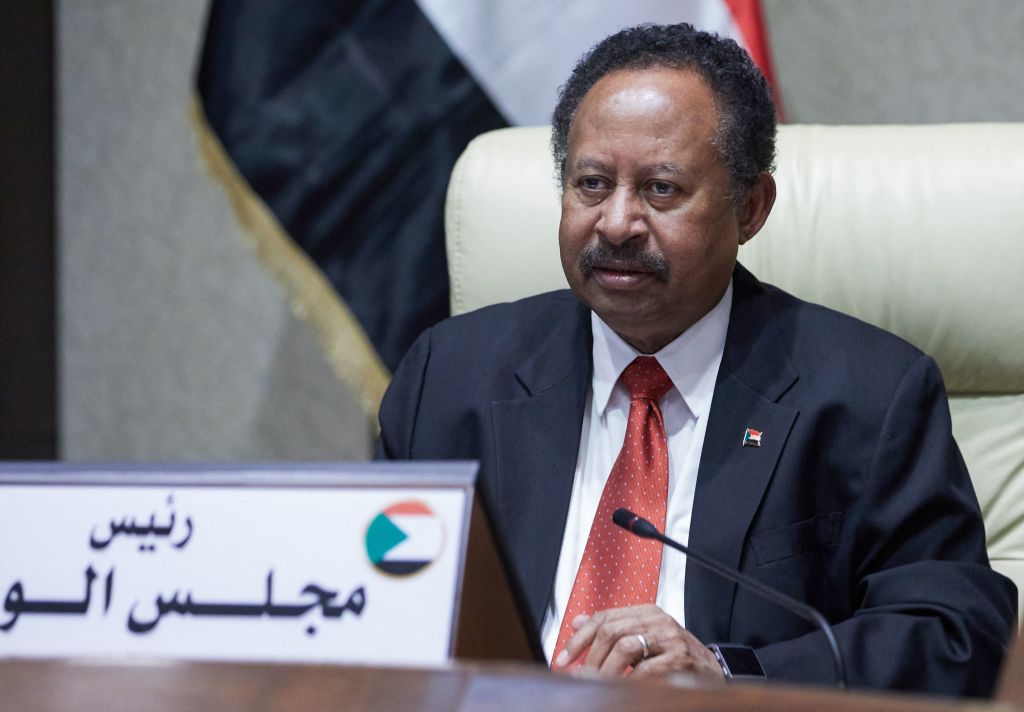ADF STAFF
Former Sudanese Prime Minister Abdalla Hamdok says it is up to the people of his country, aided by the international community, to end the brutal war that has shattered Sudan since April 2023.
“The primary responsibility for stopping this war rests with the Sudanese people,” Hamdok recently told DW during an hourlong interview. “If we are able to unite in a broad front that brings everybody together against the war, that will form the first step in stopping this war. But, also, we don’t live in isolation. We need the support that will be brought by the regional and international communities.”
The two generals at the heart of the fighting — Sudanese Armed Forces (SAF) chief Gen. Abdel Fattah al-Burhan, the de facto leader of the country, and Rapid Support Forces (RSF) leader Gen. Mohamed Hamdan “Hemedti” Dagalo — need to be held accountable for the destruction they have caused, Hamdok added.
“I believe all those who committed these atrocities should be brought to book,” he said. “They need to know that there are consequences for what you do.”
As prime minister, Hamdok led the civilian component of Sudan’s 11-member Sovereignty Council that was established to govern Sudan temporarily after the popular protests that led to the military overthrow of longtime dictator Omar al-Bashir in July 2019.
The power-sharing arrangement included five members of the military, five civilians and a civilian chairperson. The 39-month schedule called for the military, led by al-Burhan, to oversee the council for the first 21 months. Hamdok and the civilian cohort then would lead the council for the next 18 months toward the goal of becoming a parliamentary democracy.
Before civilians could take power, however, al-Burhan and Hemedti staged another coup in October 2021, briefly arresting Hamdok and other civilians who refused to back their actions. Hamdok was reinstated at prime minister a month later but resigned in January 2022.
The 2021 coup, Hamdok noted in the interview, was the latest in a long history of Sudan moving between military coups and civilian governments.
“This is the failure of the military, which has messed up the country for 55 years,” Hamdok said. “This is just a continuation of that.”
After the power struggle between al-Burhan and Hemedti turned into a war, Hamdok formed Taqaddum (“Progress” in Arabic), a civilian-based organization calling for a peaceful end to the fighting and a renewed transition to democratic rule.
As the leader of Taqaddum, Hamdok met with Hemedti, leading Sudanese Attorney General Fath al-Tayfour to accuse him and other Taqaddum members of being complicit in war crimes. Al-Tayfour has called for Interpol to arrest Hamdok.
Hamdok denies that he has chosen sides or been complicit in war crimes.
“This is a misconception,” he told DW. “We are not a broker or mediator. We are totally aligned with the aspirations of our people.”
Taqaddum has declared itself neutral regarding the widening war between al-Burhan and Hemedti that is drawing in smaller militias across the country. It has refused to recognize al-Burhan’s government operating in Port Sudan as legitimate.
The descent into violence has led some observers to suggest that Sudan could be heading toward a societal breakdown along ethnic lines like the one that led to genocide in Rwanda.
“We are working tirelessly to avoid that fate,” Hamdok told DW.
Since fighting broke out between the SAF and RSF, more than 12 million people have been displaced, and more than 2 million have sought refuge in other countries. About 25 million people — more than half of Sudan’s population — need humanitarian aid. More than 750,000 people are on the verge of starvation, according to aid groups.
The United Nations and other observers say the conflict is being fueled by outside forces, such as the United Arab Emirates, which is providing aid to the RSF. Hamdok has called for outside players to help all sides find a peaceful resolution.
Despite the fighting and destruction, Hamdok remains optimistic about Sudan’s future. Transforming Sudan into a democracy will not happen overnight, but it will happen, he said.
The Sudanese people toppled military dictatorships in 1964, 1985 and 2019, Hamdok noted.
“The Sudanese people have accumulated very strong experience with resistance,” he told DW.
The post Ex-Sudanese PM Hamdok Calls for ‘Broad Front’ to End War appeared first on Africa Defense Forum.


